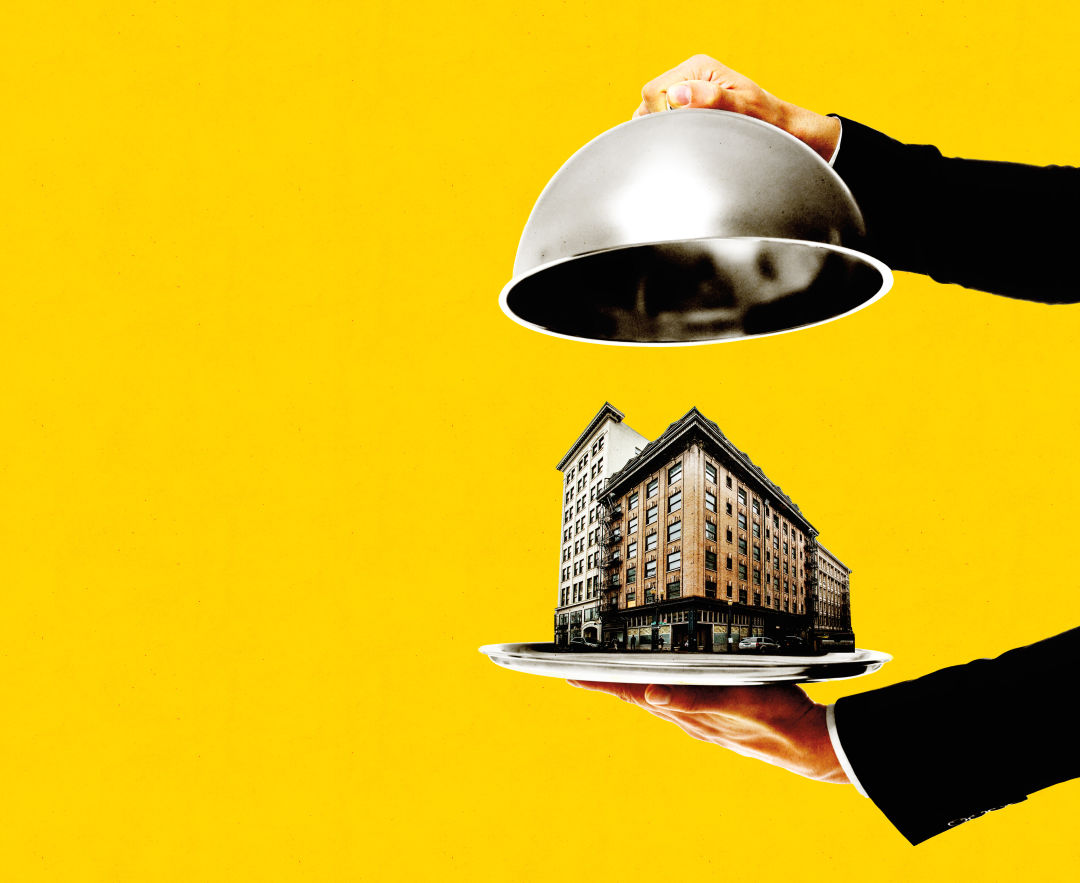Are Hotel Restaurants Cool Again?

The Woodlark Hotel will unveil a new look for a key downtown block.
Doug Adams is as buzzy as Portland food gets. A fan favorite from Top Chef, his résumé name-checks local mainstays like Paley’s Place and Imperial—as well as stints at Ping and Metrovino. But the ambitious cook’s next move has his comrades nervous.
As other up-and-comers lease 15-seat chef’s counters on the east side, Adams is opening a 3,000-square-foot restaurant in a downtown hotel. Bullard, named for Adams’s east Texas hometown, will debut in spring 2018 in the new Woodlark Hotel, under construction in adjacent buildings—a former shoe store and flophouse, respectively—at SW Alder Street and Park Avenue. “When I signed this deal I had tons of chef buddies say, ‘What are you doin’, dude? It’s gonna hold you back!’” he says.
And, true: locavore Portlanders tend to regard a splashy venture serving tourists with suspicion. But right now, hotel restaurants are officially a thing. Last fall, the historic Heathman partnered with Adams’s mentor, local food legend Vitaly Paley, to reimagine its fusty dining room. Later this month, downtown’s staid Hilton Executive Tower is slated to morph into a boutique hotel anchored by Jackrabbit, a rustic restaurant from Food Network star Chris Cosentino.
These Portland developments reflect a broader rebirth of hotel restaurants with the power to draw both travelers and locals, evinced by successes like chef April Bloomfield’s Breslin, in New York’s Ace Hotel, or energetic CBD Provisions at downtown Dallas’s Joule. The new lodging/dining generation is chef-focused and imbued with a sense of place—but also echoes earlier eras.
“Back in the 1980s, hotel restaurants were cool. You went to the Ritz-Carlton, wore a tuxedo, and danced the night away,” says Bashar Wali, president of the Portland-based boutique hotel chain Provenance, which will own the 150-room Woodlark and took over the Heathman in February. “Somehow, some way, we managed to screw them up. By the 2000s, they became hospital food.”
Provenance, which also owns Sentinel, Hotel Lucia, and Hotel deLuxe, has chipped away at that bland image, in part by teaming with trusted local chefs rather than celebrities looking to add to their national portfolio. Provenance takes on chefs as co-owners of their restaurants, rather than hired guns.
The quirky hotelier wooed Paley to debut Imperial in 2012 inside Hotel Lucia, finding the sweet spot between Portland’s wood-fired ruggedness and the expense-account business meal. Imperial’s executive chef, Doug Adams himself, cemented the restaurant’s local cred with his signature fried chicken drizzled with house hot sauce and honey from the hotel’s rooftop hive. The company tapped James Beard Award winner Jason Wilson for Hotel Max in Seattle and Top Chef alum Nina Compton for the celebrated Compère Lapin at the Old No. 77 Hotel & Chandlery in New Orleans.
“We say, ‘Here’s your vessel—make it happen,’” says Wali. “A restaurant injects a hotel with life and vibe and noise and smells. And a hotel brings a restaurant 24-7 activity and a captive audience.” Adams is still puzzling out the logistics of a downtown dining room, banquet hall, and room service, but welcomes the challenge.
“I’m a super-ADD guy. I love the nonstop serve. I want as many people to eat my food as possible,” he says. “Nothing’s gonna hold me back.
“Watch me.”




